- Home
- James A. Michener
Space: A Novel Page 2
Space: A Novel Read online
Page 2
The pace was leisurely, the talk civilized, the food reasonably good and the music from the minstrels’ balcony lively. It was impossible to believe that these diners were dedicated solely to the defeat of Adolf Hitler.
But as the evening progressed, Stanley Mott began to get his ideas organized, and before the dessert was served he knew what he must do. Moving to the side of the American general, he whispered, ‘I think you and six or seven of the top brains—’
‘Not before the toast to the King.’
‘Sir, I have the gravest information—’
‘It can wait fifteen minutes.’
‘Sir, it pertains to tonight’s raid.’
The general turned abruptly, looked at Mott, whom he had never seen before this evening, and asked, ‘That serious?’
‘It is, sir.’
The general coughed. ‘Archie, I wonder if we could speed this up?’
‘Assuredly.’ The English general indicated that the waiters should bring the dessert without clearing the table entirely, and when this was done, hastily, the men ate the quivering jelly with dispatch and leaned back as the American general rose and said, glass high, ‘Gentlemen, the King!’ When the toast was drunk, the British general rose, raised his glass, and said, ‘Gentlemen, the President of the United States!’
As soon as the ceremonies ended, Mott said, ‘Not more than eight of us.’
‘Good,’ the American general said, and forthwith he nominated the team, including three British civilian experts. The seven men and one woman—four military, four civilian—returned to the hut where the maps were and began their solemn discussion.
Mott spoke first. ‘Gentlemen and madam, it is absolutely essential that we destroy Peenemünde.’
The English general interrupted: ‘In the big meeting I kept my mouth shut. But actually, with the destruction we’ve already done to Hitler’s rocket-building capacity, we think that Peenemünde has been fairly neutralized.’
Now Mott was on the griddle and he squirmed. His task was most difficult, for he was privy to data which no one else in this room knew or could appreciate. That Peenemünde as the cradle of German rocketry had been pretty much sidetracked by the swift progress of the war, he had to concede. The massive English raids of a year ago had wrecked it temporarily, and tonight’s follow-up was intended merely to keep it off balance. The fearful rocket menace that Peenemünde had once threatened had been moved to other sites, and these men knew it.
But Peenemünde as the center for research in heavy water was a much different matter. Peroxide, as the English insisted on calling it, might prove to be the material which would enable the Germans to construct a bomb of radically different character, an atomic bomb if you will, one of which could destroy all of London in a single, searing blast. Mott could not be sure that Germany actually had a process for making heavy water, a most important agent which resulted when hydrogen atoms were displaced by deuterium. He only suspected that if the process did exist, it was functioning at Peenemünde, and he was not at all sure that if the Nazi scientists had the water, or peroxide, they would know how to convert it into a bomb.
So he opened the discussion gingerly: ‘Gentlemen, we have reason to think that the Germans have developed at Peenemünde a process for making heavy water.’
‘Oh dear,’ one of the British civilians said. ‘Not that silly-water nonsense again?’
Another said, ‘I thought we’d disposed of that monster-bomb theory a long time ago.’
Mott said, ‘I grant you, we have nothing positive on this. But our people think that if even the remotest chance exists—’
‘Mr. Mott,’ the American general interrupted with some impatience, ‘I’ve already told you, we’re going to bomb the living hell out of that place. What more do you want?’
Mott was a member of an adroitly assembled team; when they met in the White House, President Roosevelt chuckled. ‘You look properly nondescript. All types. All ages.’ Only five had specific scientific backgrounds: two university professors of atomic physics and three bright fellows from something called The Manhattan Project. The other six were a mixed bag: two businessmen, two military men in uniform, an FBI man, and to confuse enemy spies, Stanley Mott from Georgia Tech, youngest and by far the most disarming.
Roosevelt had told them two things: ‘America is about to produce a master weapon. And we have reason to believe that at Peenemünde, Hitler is doing the same.’
Concerning this basic secret the eleven were forbidden to divulge anything, but all were quietly at work. Some had already been parachuted onto the Continent. Others were being moved about by submarine. And Mott was in London, where he would probably not be noticed. On this important night he began cautiously, revealing only permitted data: ‘President Roosevelt has sent my team to Europe with a simple directive. We must destroy Peenemünde, whether it has a rocket capacity or not. And in doing so, we must under no circumstance allow our bombs to strike the living areas.’
The English general threw up his hands. ‘Damn it all, in our early raids, they were the principal targets.’
‘And thank God you missed,’ Mott said sharply.
‘Yes, we did,’ the Englishman said. ‘We had bad luck with our pathfinders. They laid their flares too far north.’
The American general looked at his watch. ‘Our men take off in two hours. The living areas are heavily targeted.’ He dropped his head slightly, so that his eyes stared straight out from under heavy eyebrows. ‘Why are we to avoid them this time, Mr. Mott?’
He almost spat out the last words, displaying the contempt which an older military man usually felt for any intruding younger civilian, and one of the English civilians noticed this. ‘Professor Mott, please explain.’ And another civilian, catching the problem, said, ‘Yes, elaborate, Professor Mott.’
Mott never used his title, earned with distinction in graduate work at Louisiana State, where he had taught the fledgling science of aeronautics, and he certainly avoided mentioning his undergraduate college, for he was tired of clever men who chanted:
‘I’m a rambling wreck from Georgia Tech
And a hell of an engineer.’
But now when these accusing generals, so much older and heavy with braid, heckled him, asking if he was really a professor, he felt he must inflate his record. ‘Indeed I am, in advanced aviation theory.’ Actually, he taught the beginners’ course.
‘Clarify your point, Professor.’
Slowly and carefully Mott looked at each of the seven. He must say enough to convince them, not enough to betray his major secret. He coughed and clasped his hands nervously, all his actions calculated to gain him a respectful hearing. ‘There are three men living in the Peenemünde camp tonight whose safety is absolutely vital to the free world. I think you can guess why.’
‘Let me try,’ an older English civilian said. ‘You Americans and we English are pitifully far behind in rocketry. We’re seeing what can be accomplished with the first generation of German rockets. And we fear the Russians are far ahead of us. So that in the postwar world …’
‘There are three German scientists we must keep alive until they reach our lines,’ Mott said. ‘Count Wernher von Braun, a relatively young man who seems to be the genius of the rocket operation. My job from here on out is to get him safely to our side. Then we badly need General Eugen Breutzl. He’s the managerial genius. We have reason to believe he’s not a Nazi, just a technical wizard who could move our program ahead by generations. And the third man is a shadowy fellow. Name seems to be Dieter Kolff, if we have it correct. He’s about thirty-five years old, and the reason we must get him is that he may prove to be the real genius of the team. He’s their expert on the A-10.’
‘What’s that?’ a civilian asked. ‘Our information doesn’t go beyond the A-6.’
‘Well,’ Mott said, as if consulting with a seminar of extremely gifted graduate students, ‘you’re the world’s experts on the A-4, which you call the V-2. You know about the
next in line, the bigger versions up through the A-6 and perhaps A-7. But we have fairly solid information that this quiet expert Kolff, if he really exists, is specializing on the A-10.’
‘And what is that?’ the same civilian pressed.
‘It’s the one that can hit New York. Fired from Germany.’ There were several gasps, after which he said, ‘Yes, A-10 or something like it is only a short time down the road.’
‘I should think you’d want to wipe out the living quarters above all else,’ the English general said. ‘Exterminate such vermin.’
‘No! No!’ Mott protested. ‘Because neither you nor we know how to make a rocket that will carry a bomb even ten miles. And we have reason to believe that the Russians are about to come up with one that will fly a thousand.’
‘So you think that we must keep these three men alive?’ the American general asked.
‘It is vital.’
‘Then why in hell do we bomb the place at all?’
And that was the question which could not be answered openly. Mott retreated rather lamely to the heavy water. ‘To eliminate a short-range danger, we’ve got to knock out the heavy-water capacity. To protect our long-range security, we’ve got to save those three German scientists.’
‘Professor Mott,’ the general snorted, ‘you sound like a damned fool. To break this on us at takeoff time for a major strike.’
‘I feel like a fool,’ Mott conceded. ‘But have we a safe phone? Please instruct your pathfinders to lay their guidance flares well away from the living quarters.’
‘We can do better,’ the English general said. ‘Young Merton, who will fly as tonight’s coordinator, is waiting outside.’
Master Bomber Merton was twenty-three years old, a blond young man weighing less than a hundred and forty. He would have been out of place as a junior master in a classroom of unruly boys, but tonight he proposed to fly unaccompanied across the North Sea to Peenemünde, where he would circle aloft for nearly two hours, radioing instructions to the four English pathfinder planes as to where they should drop their flares, and then to the oncoming American bombers as to how they should launch their devastating bombs. The fate of three hundred and ninety-eight planes would rest in his hands; he would be responsible for the future of German rocketry, German heavy-water bombs, if they existed, and the security of the free world. He grinned boyishly and seemed shy in the presence of so many experts.
The woman photographic analyst moved to the wall and pulled aside white linen sheets that hid the target maps for Peenemünde, the little island nestled along the Prussian shore. It resembled a fetus, a monstrous thing brought to birth by mad scientists, and at the far northern end stood the launching sites for the great rockets that had alarmed the world. The test stands for the engines were clearly designated, as were the command headquarters and the army barracks. In green, well down on the island, clustered the buildings labeled SCIENTISTS’ HOUSING, and it was to these that she pointed.
‘We have solid evidence from both our photographs and prisoner interrogations that the scientists you seek do indeed live here. We believe their housing was moved south after our big raids of last year.’
‘If there were heavy-water experiments under way,’ Mott asked, ‘where would they center?’
‘When we had the abortive peroxide scare a year ago—’
‘It was not abortive,’ Mott said sternly.
‘We found nothing,’ the woman continued, unruffled. ‘But we guessed that it would have been up here.’
‘That’s where we’re concentrating tonight,’ Master Bomber Merton said.
‘And that’s what must be avoided,’ Mott said almost pleadingly.
‘We can place the bombs anywhere you like,’ Merton said enthusiastically. ‘But you must tell us.’
Before Mott could respond, the American general stared at the two young men from beneath his heavy brows. ‘Is Washington committed to this strategy?’
‘It is,’ Mott said quietly. ‘I’m one of eleven men directed to spend the rest of the war trying to salvage those three Germans. Von Braun, Breutzl, Kolff. General, we must have them.’
There was a protracted silence, during which Mott wished that he could divulge what he had learned on the sand flats of New Mexico: that the United States had progressed far beyond the heavy-water principle and was in position to construct an atom bomb even more powerful than speculation had predicted. World terror was possible. It might arrive at any moment, from Russia, from Germany, from New Mexico. All things were in flux, and any nation that managed even a week’s lead over the others would have an advantage of stupefying magnitude. The bomb that these men scoffed at was a reality, or almost so, and the likelihood that Germany might be first to launch it, and with rockets that could not be intercepted, was so awful to contemplate that everything possible must be done to interdict it.
Please, please, Mott thought, make these men accept partial evidence. They’ll see the actuality all too soon.
‘It sounds like an asinine proposition,’ the American general said. ‘Bomb hell out of an island, but don’t touch the bottom half.’
‘Sometimes,’ the English general said consolingly, ‘we’re forced to adopt half-measures. To keep the whole in balance.’
‘What do you mean?’ the American asked.
‘Surely I don’t want to waste my heavy bombers striking at a temporary target like the Wassenaar launch site. You know we should be concentrating on knocking out the heavy industry. But Churchill has to give evidence to the citizens of London that we’re doing everything we can to protect them from Hitler’s rockets.’ He paused and turned to Mott. ‘How many people was it we lost today?’
‘About fifty.’
A Royal Air Force man shook his head. ‘If we know about it, all London knows about it. Fifty more dead. And the other day smack into a cinema. Two hundred dead that time. So we have to bomb Wassenaar.’
‘Is this line safe?’ the Master Bomber asked.
‘Yes.’
Merton spoke with his people at Benson Air Force Base in the direction of Oxford, and Mott could hear him planning the night as if it were a game: ‘Four pathfinders will find me already over the target. You’ll drop your flares well away from the living quarters marked in green. Plenty of moonlight. Plenty of visibility. Ten minutes after you leave, the Moon will set and it will be dark. Then the Yanks come on. I’ll vector them in, but they must not overshoot the flares. Is that understood? Roger and out.’
Visualizing both the German A-4 rockets and the monstrous American bombers, Mott wondered at the curious and self-defeating decision made by Adolf Hitler. One of his famed rockets could deliver about a ton of explosive, and never on a precisely determined target, while an American bomber, which cost about the same as a rocket, could drop six tons within a closely defined area.
At first glance it seemed that Hitler had made a hideously wrong choice, but Mott also knew that before long the Germans would have stouter rockets capable of delivering eight and ten tons of explosives, and his secret briefings had caused him to fear that within the year someone would have a new kind of bomb which would be calculated in the million-ton range, and someone else would have rockets which could deliver such a bomb across the Atlantic.
These were the days of awesome decision, and he watched with relief as Master Bomber Merton put down the phone, tapped the map, and said cheerily, ‘Whatever they have hiding at Peenemünde, it gets a thrashing tonight.’ And off he went to direct his hornets to a target which might or might not be fabricating heavy water to be used in an atomic bomb which might or might not be completed in time to annihilate London within the near future.
When he departed, Mott sighed. The hiding place of Von Braun, Breutzl and Kolff would be spared for one more night.
‘Was it really so important, Professor Mott?’ one of the American generals asked.
‘The security of the world might well depend upon what we accomplish this night.’
On this s
ame afternoon of 24 October 1944 the remnants of the Japanese Imperial Navy, badly battered by incessant American pressure, launched one of the most daring ventures in the history of naval warfare. It was a door-die effort made inescapable by General MacArthur’s recent surprise landing in the Philippines. Japanese intelligence saw quickly that MacArthur’s forces were not well secured and that a bold strike might drive them from the Philippines, bloody MacArthur’s nose, and give Japan a year’s respite to strengthen its homeland defenses.
This stupendous effort of throwing every available fighting ship and airplane against the Americans was called Sho-Go (Operation Victory) and its success depended upon the resolute performance of three war-hardened admirals who had been asked, each one separately, to perform a miracle. The top planners had every reason to believe that Sho-Go would drive the Americans from the sea, and humiliate MacArthur once again.
Sho-Go had three simple principles, the intermeshing of which would ensure a surprising victory. The entire surviving fleet would be divided into three parts, each with a totally different responsibility. The North Fleet, under the command of Admiral Ozawa Jisaburo, would sail down from Japan, allow itself to be seen, and then toy around north of the Philippines in hopes that Admiral Halsey would be tricked into rushing north with the bulk of the American fleet. These ships constituted a decoy which, because it would be outnumbered if Halsey fell into the trap, could expect to lose many of its major components. To make the bait more alluring, this fleet brought with it four huge carriers on the principle that ‘Admiral Halsey can never resist going for our carriers.’ They would be especially vulnerable.
The South Fleet drew the suicide mission. It would form off Borneo, well to the south of the Philippines, steam north, keeping to the coast of Asia, and then come sweeping east to pick its way through a narrow strait, which, if negotiated, would throw the great battleships and cruisers right onto the lap of MacArthur’s shorebound men. But to accomplish this, the South Fleet would have to break through a relatively small American defensive fleet that would probably be alerted and waiting at the exit from the strait. That a naval battle of tremendous magnitude must take place, there was little doubt, and the Japanese admiral in charge of this fleet had good reason to suppose that by nightfall on 25 October he and all his ships would be dead.

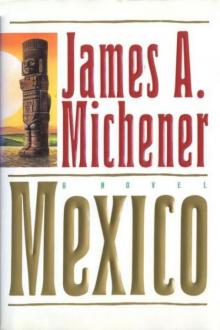 Mexico
Mexico The World Is My Home: A Memoir
The World Is My Home: A Memoir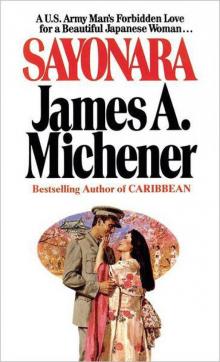 Sayonara
Sayonara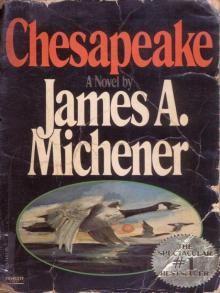 Chesapeake
Chesapeake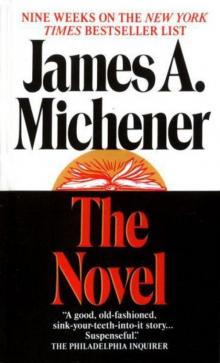 The Novel
The Novel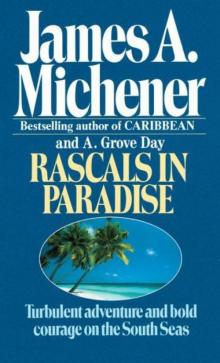 Rascals in Paradise
Rascals in Paradise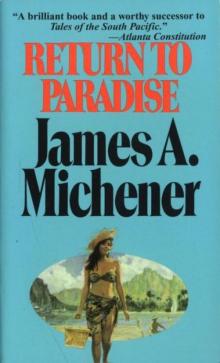 Return to Paradise
Return to Paradise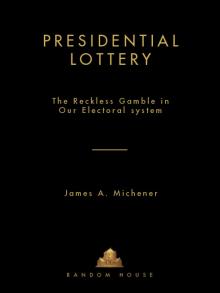 Presidential Lottery: The Reckless Gamble in Our Electoral System
Presidential Lottery: The Reckless Gamble in Our Electoral System The Source
The Source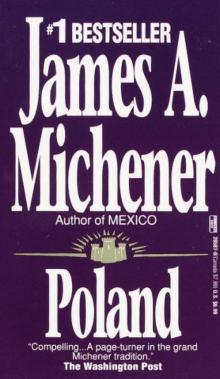 Poland
Poland Space
Space Caravans
Caravans Creatures of the Kingdom: Stories of Animals and Nature
Creatures of the Kingdom: Stories of Animals and Nature Iberia
Iberia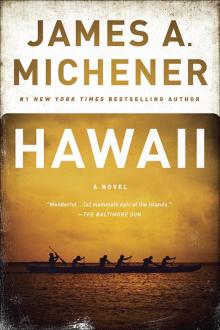 Hawaii
Hawaii The Watermen: Selections From Chesapeake
The Watermen: Selections From Chesapeake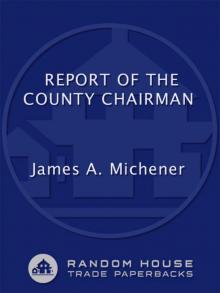 Report of the County Chairman
Report of the County Chairman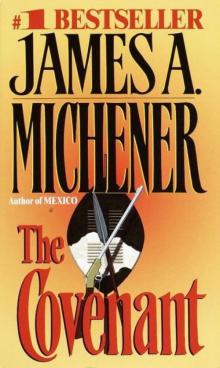 The Covenant
The Covenant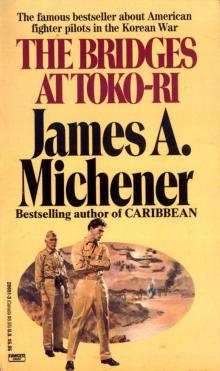 The Bridges at Toko-ri
The Bridges at Toko-ri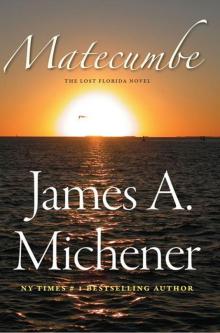 Matecumbe
Matecumbe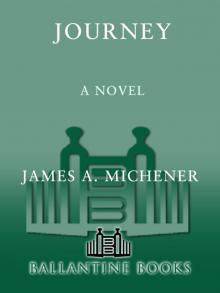 Journey: A Novel
Journey: A Novel Centennial
Centennial Sports in America
Sports in America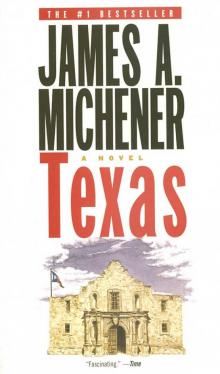 Texas
Texas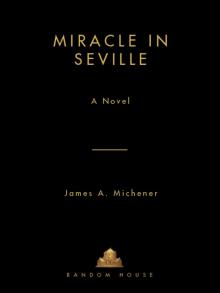 Miracle in Seville
Miracle in Seville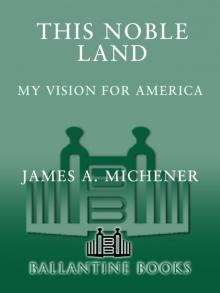 This Noble Land: My Vision for America
This Noble Land: My Vision for America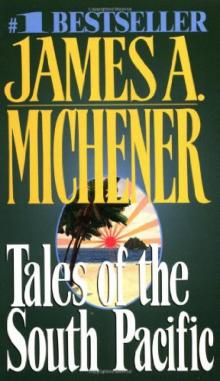 Tales of the South Pacific
Tales of the South Pacific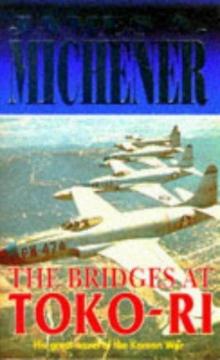 Bridges at Toko-Ri
Bridges at Toko-Ri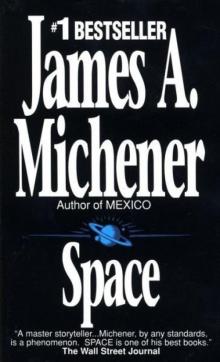 Space: A Novel
Space: A Novel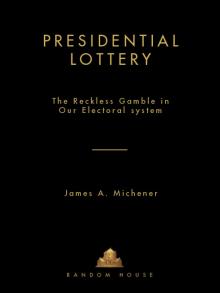 Presidential Lottery
Presidential Lottery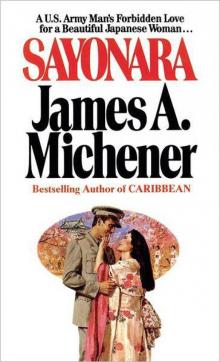 Sayonara: A Novel
Sayonara: A Novel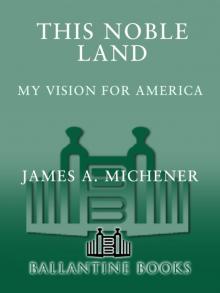 This Noble Land
This Noble Land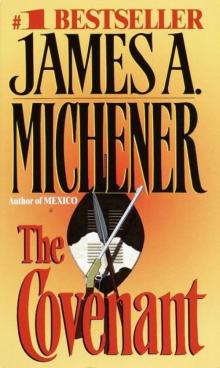 The Covenant: A Novel
The Covenant: A Novel Miracle in Seville: A Novel
Miracle in Seville: A Novel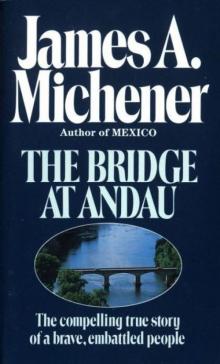 The Bridge at Andau
The Bridge at Andau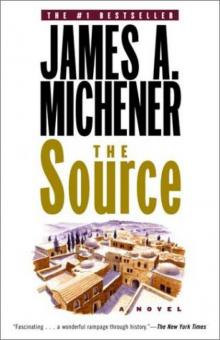 Source
Source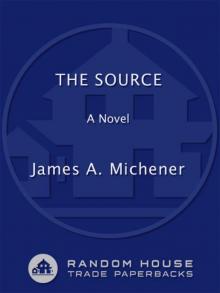 The Source: A Novel
The Source: A Novel Journey
Journey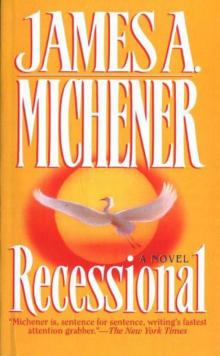 Recessional: A Novel
Recessional: A Novel Legacy: A Novel
Legacy: A Novel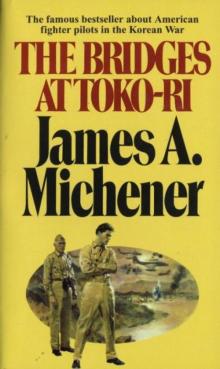 The Bridges at Toko-Ri: A Novel
The Bridges at Toko-Ri: A Novel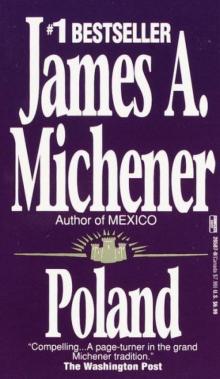 Poland: A Novel
Poland: A Novel